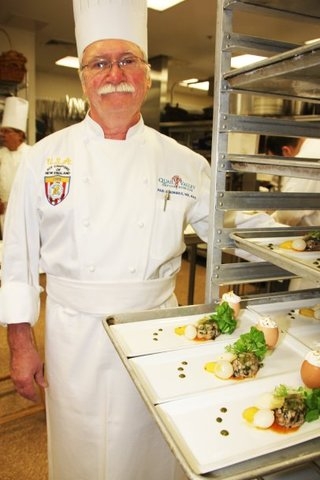
Embrace What You Do
28 February 2020Qualities and responsibilities of mentoring the future cooks and chefs who pass through your kitchen.
By Paul Sorgule, MS, AAC
Stop for a moment and think about your role and the importance of what you do. As a teacher or program administrator, you are one of the most important life guides a student will ever have. Your commitment, actions, professionalism, pursuit of excellence, standards, vision, and enthusiasm for food and the businesses that surround it will establish the same in every student who passes through your kitchens. Regardless of their age, previous background, and ability – your influence will shape the type of cook, future chef, manager, entrepreneur and person they will turn out to be. Now, that is some responsibility.
With this in mind – ask yourself these very important questions: How much do you love the food business? Do you truly embrace it at the level of a mentor? Love infers there is understanding, acceptance of flaws, honesty, full-on commitment, enthusiasm, respect, and appreciation for someone or something; in this case – both.
Do you have what it takes as an instructor and/or a program administrator to deserve the role of career and life mentor? Do you exhibit this every day, with every student and do you truly appreciate just how influential your words and actions might be? Take stock:
- Do you love the ingredients chefs and cooks have the pleasure to work with? Do you embrace all stakeholders who participate in bringing those quality ingredients to American kitchens? Do you display your admiration for and support of farmers, fisherman, ranchers, processors, and distributors? Your connection with and respect for the people and ingredients of the food system will become the basis for every students’ approach throughout their career.
- Do you love and embrace restaurants of all types – relish those who work hard to do things right, and offer a hand to those who need to learn how? When we embrace every segment, every restaurant, and every person engaged in bringing food to America then we show our students just how important their active role can be.
- Do you take pride in the history of the profession and those individuals who continue to make a difference in how cooks, chefs, and restaurateurs act as caretakers of our proud past and our bright future? If we care about how we portray the field of cooking then our students will likely do the same.
- Do you take pride in the uniform and what it represents? Do you present yourself as a professional in the way you act and interact? Do you demonstrate to students how important it is to be honest, sincere, empathetic, strong in character, and consistent in applying standards of excellence to everything you do?
- Are you a passionate diner who truly enjoys the restaurant experience and the food impressions chefs and cooks create? Do you share this passion with students? Your consistent enthusiasm for food and those who prepare it will rub off on students.
- Do you show real interest in helping the food industry constantly improve, celebrate wins, and recognize shortcomings? When your students see how important it is to bring up the entire industry then they will be more likely to carry that torch when they hold positions of responsibility.
- Do you take students under your wing when they struggle and seek to find ways to help them understand they can control their future? This is what mentors do.
- Do you collaborate with all other faculty members as a team with a common purpose – to set the stage for students to find their way and make a difference? It truly does take a village to prepare students to become tomorrow’s chefs and leaders.
- Do you take the time to break bread with all stakeholders in the educational process – teachers, chefs, employers, farmers, producers, students, restaurant customers, and those organizations that are dedicated to building an extraordinary industry? This is what educators and educational leaders must do. When we break bread with others we break down barriers and misunderstandings and build alliances and show our students how food is a universal language.
- Do you set the example every day for others to follow? This is your opportunity, this is your role, this is your responsibility. Embrace what you do and the rewards will be many.
Plan Better – Train Harder – Embrace What You Do
Paul Sorgule, MS, AAC, president of Harvest America Ventures, a mobile restaurant incubator based in Saranac Lake, N.Y., is the former vice president of New England Culinary Institute and a former dean at Paul Smith’s College. Contact him at This email address is being protected from spambots. You need JavaScript enabled to view it..
